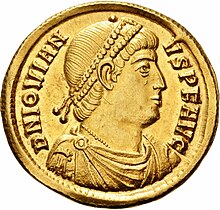| Jovian | |||||
|---|---|---|---|---|---|
 Solidus depicting Jovian | |||||
| Roman emperor | |||||
| Reign | 27 June 363 – 17 February 364 | ||||
| Predecessor | Julian | ||||
| Successor | Valentinian I (West) Valens (East) | ||||
| Born | 331 Singidunum, Moesia Superior, Roman Empire | ||||
| Died | 17 February 364 (aged 33) Dadastana, Anatolia, Roman Empire | ||||
| Burial | |||||
| Spouse | Charito | ||||
| Issue | Varronianus another son | ||||
| |||||
| Father | Varronianus | ||||
| Religion | Nicene Christianity | ||||
Jovian (Latin: Jovianus; ‹See Tfd›Greek: Ιοβιανός, translit. Iobianós; 331 – 17 February 364) was Roman emperor from June 363 to February 364. As part of the imperial bodyguard, he accompanied Julian on his campaign against the Sasanian Empire. Julian was killed in battle, and the exhausted and ill-provisioned army declared Jovian his successor. Unable to cross the Tigris, Jovian made peace with the Sasanids on humiliating terms. He spent the rest of his seven-month reign traveling back to Constantinople. After his arrival at Edessa, Jovian was petitioned by bishops over doctrinal issues concerning Christianity. Albeit the last emperor to rule the whole Empire during his entire reign, he died at Dadastana, never having reached the capital.[b]
- ^ a b Drijvers 2022, p. 28.
- ^ Cameron 1988.
Cite error: There are <ref group=lower-alpha> tags or {{efn}} templates on this page, but the references will not show without a {{reflist|group=lower-alpha}} template or {{notelist}} template (see the help page).